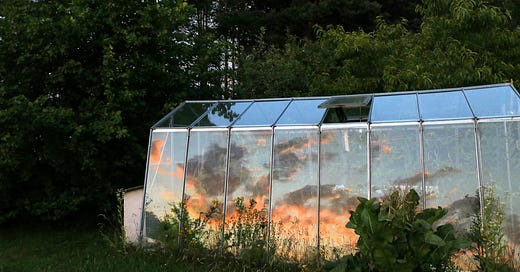Robert confronts Isaac at his greenhouse
Who by Fire: Chapter 39: Audio and prose
Note: Update: Robert confronts Isaac while he builds the greenhouse …
You can start reading here or anywhere, then go back. See Table of Contents. Come in the middle? Robert is the narrator who discovers after his wife Lena has died that she had a lover, Isaac. Evan is Isaac’s wife. Robert is on a search for how he lost Lena: He’s creating the story through memory, invention and a search for the truth and his role in what happened—and by stalking Isaac.
The Greenhouse
This time I called and asked if I might come to “the farm,” as he called it. I suppose Evan called it that too: The farm. I did not bring the psalm.
He was in the greenhouse. He was in the middle of it, of making something solid, reliable, something for Evan. He had the batter boards done, had finished the excavation by hand. The shovel was in his hand. The lumber for the frame sat nearby in a pile that he was sorting or arranging in some way. I knew he would have to pour the footings even if he’d use a dirt floor. A cement truck would be an extravagance for this small job and I had to admit that I was impressed to see that he had not bought the concrete already mixed but was unimpressed that he had instead rented a portable cement mixer. I would have saved money by rigging up an old steel tray from the farm, some leftover piece of equipment or part of a trailer camper someone had ditched on the side of the road in Iowa, rusted out, but still usable for chores like this. I would have driven to a construction site nearby—someone was always building something—and bartered for the cement, mixed it myself and gotten the thing done cheaply and properly. He had yet to dig the holes for the footings. I wondered if he was inexperienced at this, might mix the cement before he’d dug the holes and I had a certain understandable desire for superiority. “You’ll be wanting to dig those holes first.”
I wanted to dig a hole. I longed for this work from my past, when my father and I built the storage shed on the south farm when I was seventeen. Hard work, blisters on the hands, aches in the back of my legs, the smell of sweat and dirt, my father’s neck, wrinkled with years and sun. I needed to work without thinking. I couldn’t imagine that I would help him or that he would let me.
Isaac was insulted by my comment. I could see this in the angle of his back, the shift of his shoulders, a subtle move away—he was too cool-headed to step back. He leaned on his shovel and waited, didn’t respond to me. We both knew what he’d be doing next. I said, “She’s dying. To state the obvious. I state it because in the face of death things can be said. I would hope you agree.”
“Agreed.”
“Tell me something about her. I know that’s not the question or to be more accurate the assertion you expected. Or to be more blunt, the accusation. Don’t answer me yet. Indulge me. I want an answer from you that I can’t predict. I don’t want to know about her work unless that’s key to something I need to know. I also want you to know that I suspect you are a calculating person.”
“What do you mean by that?”
“You calculate the risk and work within what for you is the margin of safety. I don’t want an answer within that margin. If you’ll allow a metaphor, something my wife is much better at creating—but then you know that—the page of your book has been written, I observe, to your satisfaction. On that book page, she has been in the margin. A marginal note. Let’s you and I agree that we will write our lives for now in the margin.”
“Hardly.”
“Better. Good. Now tell me something about her.”
“Why would I want to do this? What is it you’re really after?”
“I don’t like you much. I guess you know that. So, I suppose there’s no good reason you’d want to do this. To tell you the truth I don’t know how to deal with what’s happening, with losing her, because I think I had already lost her and wasn’t smart enough to know it. There were things I should have seen. I suppose you’d like an example? No?” He had turned away from me now, begun digging. “The time she suggested we make love every day between Christmas and New Year’s one year when I took that whole week off. I think back on it now and wonder what that was about. You’d think I’d think it was about desire. Yeah, I rejected her. No, we didn’t make love every day. We probably didn’t make love at all that week.”
He kept digging. “Robert, I’m not interested.”
“Bullshit. You’re interested. Wanna know which year that was?”
“No.”
“It’s like I’m mad or this is a dream.”
He put the shovel down and looked at me. I had his attention and didn’t know why.
“She says that, doesn’t she?”
He kept his eyes on me but didn’t answer.
“I keep saying that because she keeps saying it. And I keep asking, ‘What are you talking about?’ She talks about chariots on fire and dreams and craziness. And then one day while she was drifting off from the so-called cocktail I give her to relieve the agony she’s in, she said with a surprising clarity—these moments are full of confused stories—I’ll explain that too in a minute, one of the stories. So she says, ‘Twelfth Night.’ And I say, ‘What about it?’ And she says, ‘Read it, Robert. It’ll help.’ You still with me, Isaac?”
He was digging again. “I’m listening.”
“And then she drifts the way she does on the cocktail and says, ‘The time has changed. Like we’re on Pacific time. Or maybe as small as the change to daylight savings time. The time has changed and I’m off, always slightly off. Time changes like this in a play. Like theater. Only this is real. The way the sets change and you the audience in that split second are in another place, another room, all through the workings underneath of a turnstile.”
“Yeah, well, she’s ill, right?”
“So, Isaac, we’ll just call her crazy, huh? Sick and crazy?”
“No, we won’t do that.”
“Thank you. I agree. So, I read the play and that line is in there, that thing she keeps saying, ‘I’m mad or this is a dream.’ Here’s how it really goes. Listen: I am mad, or else this is a dream. Let fancy still—hear ‘fancy’ as ‘imagination.’ I probably need to help you with this a bit. Stay with me, try to follow, damn you. Why not put the fucking shovel down.”
“I’ll hold onto it, if you don’t mind,” but he’d stopped digging.
“I am mad, or else this is a dream. Let fancy still my sense in Lethe sleep; if it be thus to dream, still—hear ‘still’ as ‘always’—let me sleep! And I wonder, Is she trying to forget because, you see, I look up ‘Lethe,’ the river of forgetfulness. But then, you see, I’m with her every day now while she slides away from me and what she’s worried about is not being able to remember. She’s not trying to forget. She’s trying to remember, damn you.”
“”Robert, you want a beer?”
“No, damn it, I don’t want a beer. Well, yeah, maybe I do. But not from you. Listen to me, damn you, listen to me. Here’s the story of the play in short form: Sebastian is Viola’s brother who falls in love with Olivia who thinks he is Orsino who is Viola in disguise. Everyone’s confused. It’s a comedy. Isn’t that one of the keys to comedy? Confusion of some sort. I don’t know. But what we’re doing here is no comedy. And there’s a whole lot of confusion. I don’t know who I am or who you are. I want to know who Lena is. Damn you, Isaac, tell me something about her.”
“Robert, it’s hot out here. Let me get us a couple of beers. I’ll be right back.” He took his shovel, pushed it hard into the ground, the way you do when you’re done working for a while and want it there when you return. He went into the house and there I was looking at the hole he’d dug. Dirt and a hole and I don’t want her in the ground. I can’t bear the thought of her in a box in the ground, of throwing dirt on the box the way we did when her mother died. I took his shovel and threw it across the yard.
He returned with a Sam Adams summer ale. I took it. “Designer beer, huh?”
“Robert, a beer’s a beer.”
“No, nothing’s what it seems. Nothing.”
“And the stories? You said there were stories, Robert.”
“Sure, sure. Here’s one you’ll like. She says Evan knows this story or she knows June in the story. It’s about June and Gertrude and Augusta. It’s about three sisters. And the young one, June is the young one. She has a baby. And the baby ends up in a damned suitcase. And Gertrude is Hamlet’s mother. I don’t know what she’s talking about.”
“I have a case. Three sisters lived in a house in Tenley. Somebody bought the house after they were dead and gone. And the woman was having some work done. Air-conditioning, I think. Anyway, some workman finds a suitcase in the attic. Real old attic, real old suitcase and some bones fall out. Tiny bones. I got called in, told her about it. Or she could have read it in the paper. This is just some sort of hallucinating about something’s she’s read or heard. It’s nothing, Robert. The case isn’t even worth talking about. It’s one of those dead letter cases. All I did was file a report.”
“But the report was about a baby, wasn’t it?”
“Yeah, it was.”
“Damn you, tell me something about my wife. Tell me something about her.”
He said, “I would have liked to see her walk into the sea.”
He will think of her this way when he and Evan go to the sea. He will think that perhaps he has dreamed her. He will have trouble recalling her though he will know that he has her in his head. She will be like a dream he tried to remember while lying in the semi-conscious moments of waking.
Isaac needs to dig the holes for the footings. He will pour cement in these holes. I imagine that he has handed me a shovel. Together we dig. He digs his hole. I dig mine. We don’t talk. We move dirt, piles of dirt separate us. I recall the farm where I grew up and the plowing of the field in early spring when the frost had lifted, the plowing that we began with the rising sun.
Perhaps I would return the next day to help him pour the concrete and the next to help him build the frame. But he wouldn’t want me. I knew that.
But what if I had? What if?
I would have suggested that if he were going with the dirt floor, we use 6 x 6 for the sills and build the frame up from that.
We will talk only of the work and we’ll lunch on leftovers from the dinner he and Evan have prepared. Each day I’ll come after visiting Lena. And on the fourth day, when we’ve completed the frame, framed each window—The framing is all about windows in a greenhouse—we would begin the roof. (He had taken two weeks off to build the greenhouse.) Then I’d begin to talk. Would I have asked? Accused?
I did not help him build the greenhouse.
We would meet again, and again it would be at my prompting. This I could not have predicted that day, the day he gave me the sentence: I would have liked to see her walk into the sea.▵
Table of Contents
Coming next: Chapter 40: “My Story”
Only Connect, all sections, and this serial novel come from my heart and soul—and ten years of research. I know the saying ‘time is money’: I couldn’t help but pursue this story. If you have already gone paid, my heart goes out to you with my thanks.
Love,







Aah, we all need to cross a river of forgetfulness
The mix of the concrete (no pun intended) - "He took his shovel, pushed it hard into the ground, the way you do when you’re done working for a while and want it there when you return" - with the lyrical - "I would have liked to see her walk into the sea" works magic in this section.